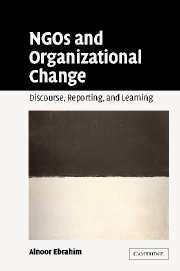Book contents
- Frontmatter
- Contents
- List of figures
- List of tables
- Acknowledgments
- List of abbreviations
- Introduction
- 1 The making of NGOs: the relevance of Foucault and Bourdieu
- 2 The NGOs and their global networks
- 3 NGO behavior and development discourse
- 4 Interdependence and power: tensions over money and reputation
- 5 Information struggles: the role of information in the reproduction of NGO-funder relationships
- 6 Learning in NGOs
- 7 Challenges ahead: NGO-funder relations in a global future
- Notes
- References
- Index
2 - The NGOs and their global networks
Published online by Cambridge University Press: 22 September 2009
- Frontmatter
- Contents
- List of figures
- List of tables
- Acknowledgments
- List of abbreviations
- Introduction
- 1 The making of NGOs: the relevance of Foucault and Bourdieu
- 2 The NGOs and their global networks
- 3 NGO behavior and development discourse
- 4 Interdependence and power: tensions over money and reputation
- 5 Information struggles: the role of information in the reproduction of NGO-funder relationships
- 6 Learning in NGOs
- 7 Challenges ahead: NGO-funder relations in a global future
- Notes
- References
- Index
Summary
This chapter provides essential background information to the key organizations discussed in this book: AKRSP (I), Sadguru, the European Commission, the Aga Khan Foundation, the Ford Foundation, and the Norwegian Agency for Development Cooperation. It first provides an introduction to the genesis of Sadguru and AKRSP (I) and a summary of their primary activities. This material is followed by details on key international funders. The descriptions below are kept brief, with additional information being provided as necessary in subsequent chapters.
The Southern NGOs
Sadguru
A primary objective of the Navinchandra Mafatlal Sadguru Water and Development Foundation is “to improve the living conditions of rural and tribal people, chiefly by developing environmentally sound land and water resources programmes” (Sadguru 2001: n.p.). The organization prioritizes efforts to increase long-term economic productivity of land and water resources and also to reduce rural–urban migration. Since its founding in 1974, the NGO has worked primarily with the “tribal” populations of Dahod District in north-eastern Gujarat state (see figure 2.1), and it has also expanded its activities over the past decade into the neighboring states of Madhya Pradesh and Rajastan.
The work of Sadguru developed out of the activities of an organization known as Shri Sadguru Seva Sangh Trust (SSST) in the early 1970s. SSST was initially involved in natural disaster relief and was financed by a major Indian industrialist, who had been inspired by a “free kitchen” set up by a humanitarian figure during droughts in eastern India in 1967.
- Type
- Chapter
- Information
- NGOs and Organizational ChangeDiscourse, Reporting, and Learning, pp. 21 - 33Publisher: Cambridge University PressPrint publication year: 2003



